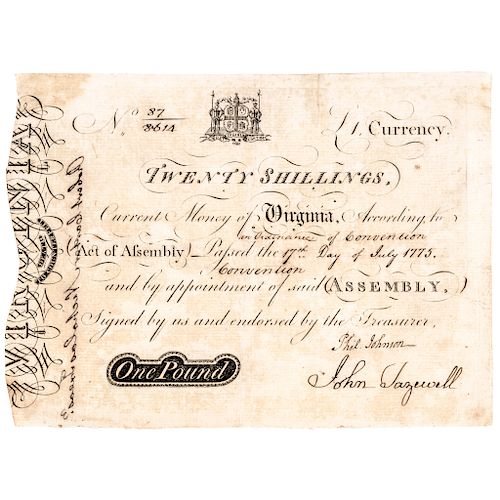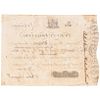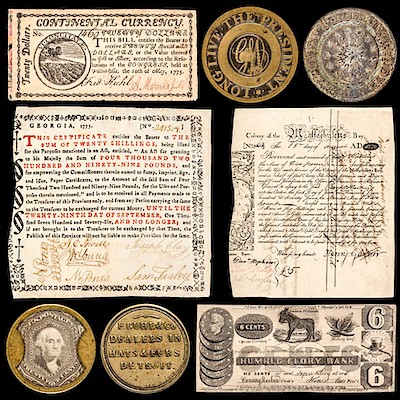Colonial Currency Note, VA, July 17, 1775 20s, Engraved Large ASHBY Form
Lot 130
Estimate:
$900 - $1,200
Absentee vs Live bid
Two ways to bid:
- Leave a max absentee bid and the platform will bid on your behalf up to your maximum bid during the live auction.
- Bid live during the auction and your bids will be submitted real-time to the auctioneer.
Bid Increments
| Price | Bid Increment |
|---|---|
| $0 | $10 |
| $200 | $20 |
| $300 | $25 |
| $500 | $50 |
| $1,000 | $100 |
| $2,000 | $200 |
| $3,000 | $250 |
| $5,000 | $500 |
| $10,000 | $1,000 |
| $20,000 | $2,000 |
| $30,000 | $2,500 |
| $50,000 | $5,000 |
| $100,000 | $10,000 |
| $200,000 | $20,000 |
| $300,000 | $25,000 |
| $500,000 | $50,000 |
About Auction
By Early American History Auctions
Jul 13, 2019
Set Reminder
2019-07-13 12:00:00
2019-07-13 12:00:00
America/New_York
Bidsquare
Bidsquare : Colonial & Continental Currency-Coinage-Historic Peace Medals- Encased Postage Stamps
https://www.bidsquare.com/auctions/early-american-history-auctions/colonial-continental-currency-coinage-historic-peace-medals--encased-postage-stamps-4256
Historic Coins, Colonial & Continental Currency, Political, Americana, Encased Postage Stamps, Peace Medals Early American History Auctions auctions@earlyamerican.com
Historic Coins, Colonial & Continental Currency, Political, Americana, Encased Postage Stamps, Peace Medals Early American History Auctions auctions@earlyamerican.com
- Lot Description
Virginia Currency
Impressive July 17, 1775 Virginia 20s Large ASHBY Form
Current Money of Virginia. July 17, 1775. Twenty Shillings. Handwritten Date. Large Format Form engraved by John "Ashby, Sclpt." Choice Extremely Fine.
Fr. VA-77b. This 1775 Revolutionary War Large Format John "Ashby" engraved Virginia Bank Form appears very close in quality to the Newman plate illustration found on page 445 of the 5th edition "THE EARLY PAPER MONEY OF AMERICA" reference by Eric Newman. It has four excellent fully wide margins. Its pleasing, clean and attractive overall appearance is superior to most seen. There is a near invisible deft sealed short split at top right margin edge in the selvage. All of this handsome notes rich black text and designs are sharp and extremely well printed. This note is just lightly circulated with fresh, clean period fine quality laid watermarked paper. Large printed text "VIRGINIA" included as part of the left margin's indent border design, as does the printed tiny "Ashby Sclpt." (Sculptor) identification. The prominent warning, "DEATH TO COUNTERFEIT" is printed white on black in reverse. All text and manuscript portions along with the signatures are very clear. Boldly endorsed on the blank reverse side by the Virginia Treasurer, "Robert Carter Nicholas Treas."
Robert Carter Nicholas was a Virginia lawyer and political figure. He served in the Virginia House of Burgesses, the General Assembly, and the Court of Appeals, predecessor of the Supreme Court of Virginia.
Nicholas was the son of Dr. George Nicholas and Elizabeth Carter Burwell Nicholas (widow of Nathaniel Burwell) of Williamsburg, Virginia. His father migrated to Virginia; his mother was the daughter of wealthy Virginia landowner, Robert "King" Carter of Corotoman. Born January 28, 1728/9, both parents were dead by 1734.
He studied law at the College of William and Mary and practiced in the general court under the royal government. He served in the House of Burgesses, 1755-61 as the representative from York County, and from 1766-1775 as the representative of James City County, and was Treasurer for the colony of Virginia, 1766-1775.
From 1761 to 1774, Robert Carter Nicholas was one of the trustees of the Bray school - a charity school for black children - in Williamsburg, Virginia. He was the principal correspondent with Dr. Bray's Associates in England, who financed the school.
In October 1765 along with John Randolph and George Wythe was part of committee that heard Thomas Jefferson's bar examinations. Later when he became Treasurer of Virginia, he stopped taking new cases and turned over many of his existing cases to Thomas Jefferson.
When in 1769 Peyton Randolph speaker of the House of Burgesses chose Jefferson to write a response to Royal Governor Botetourt's opening remarks to the House, his motions although accepted and passed were felt in committee to be "lean and tepid" requiring rewrite by Nicholas. Jefferson never forgot this humiliation.
In fact, in 1774 Jefferson had to rewrite a motion written by Nicholas objecting to Governor Dunmore's land proclamation. Also in May 1774, Nicholas introduced a motion written by Thomas Jefferson making June 1 a "day of fasting, humiliation, and prayer" to express sympathy of Virginia for their sister colony of Massachusetts as a result of the closing of the Port of Boston by the British.
On December 13, 1775 Nicholas after the battle of Great Bridge introduced a motion in the House of Burgesses denouncing Lord Dunmore as champion of "tyranny" a monster, "inimical and cruel" for pronouncing martial law and assuming powers, the "King himself could not exercise." Two days later he also submitted a motion to grant pardons to black slaves who he claimed had been deluded by the British to join Loyalist forces.
Nicholas opposed the adoption of the Declaration of Independence, but he was a member of the committee appointed to draft a declaration of rights and a new form of government for Virginia. He was a member of the Virginia General Assembly from 1776 to 1778 and in 1779 was appointed to the high court of chancery. Consequently he became a member of the first Court of Appeals, predecessor of the Supreme Court of Virginia. Judge Nicholas died in 1780, so only served one year.
Nicholas married Anne Cary, daughter of Wilson Cary of Warwick County in 1751 and the couple had four daughters and six sons. His grandson, Robert C. Nicholas was a United States Senator from Louisiana, and his daughter Elizabeth (1753-1810) married Edmund Randolph, the first United States Attorney General.
- Shipping Info
-
Early American provides in-house worldwide shipping. Please contact us directly if you have questions about your specific shipping requirements.
-
- Buyer's Premium



 EUR
EUR CAD
CAD AUD
AUD GBP
GBP MXN
MXN HKD
HKD CNY
CNY MYR
MYR SEK
SEK SGD
SGD CHF
CHF THB
THB












